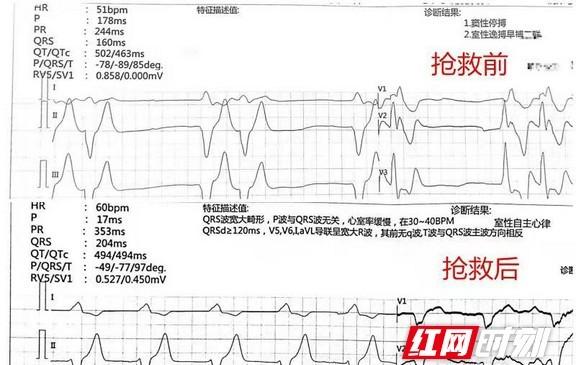
Red Net Moment, February 12 (correspondent Liu Yiqun Chen Jing) Only because of the failure to do dialysis treatment according to regulations during the Spring Festival, 61-year-old Mr. Zhou suddenly had a cardiac arrest, fortunately he was rescued by the medical staff of Hunan Provincial People's Hospital in time, so as to avoid being pulled away by the "god of death". On February 11, after active treatment, Mr. Zhou regained consciousness and his vital signs were stable.
Mr. Zhou, a 61-year-old man living in Mawangdui, Changsha, has suffered from diabetic nephropathy and chronic renal insufficiency for many years, and needs regular hemodialysis treatment twice a week for 4 hours each time. However, during the Spring Festival, Mr. Zhou only underwent hemodialysis treatment once every 3 hours. On the morning of February 6, Mr. Zhou was already pale, weak and breathing. In the early morning of February 7, Mr. Zhou suddenly lost consciousness, and his family urgently sent him to the second emergency department of the Mawangdui Branch of Hunan Provincial People's Hospital for rescue.
At the time of admission, the patient lost consciousness, had a cardiac arrest, and was in a critical condition. The doctor on duty, Xiao Shasha, and the nurse immediately gave rescue and treatment measures such as cardiopulmonary resuscitation, endotracheal intubation, ventilator-assisted ventilation, and adrenaline strengthening. After about 6 minutes of rescue, the patient regained his spontaneous heartbeat, but the heart rate was still extremely slow. Upon examination, Mr. Zhou's blood potassium was as high as 7.18 mmol/L (normal blood potassium value ranged from 3.5-5.3 mmol/L), and the diagnosis was that he had cardiac arrest due to chronic renal insufficiency and hyperkalemia. Immediately, the medical staff immediately performed emergency bedside hemodialysis treatment. After the patient's blood potassium dropped to normal, but because the heart rate was still unstable, the consciousness was still not restored, and he was included in the ICU for further comprehensive treatment.
Under the meticulous treatment of the medical staff of the second emergency department, Mr. Zhou was mentally cleared on the second day of hospitalization and successfully removed the tracheal catheter, and was able to breathe spontaneously. At present, Mr. Zhou not only has stable vital signs, but also can communicate normally, eat independently, and have no neurological sequelae.
"Hyperkalemia is a fatal condition that can lead to arrhythmias, cardiac arrest, etc., which seriously threatens the lives of patients." Cao Yan, director of the second department of emergency department, introduced that when the blood potassium is mildly elevated, it will be manifested as weakness of the limbs, paresthesia of the hands and feet, muscle soreness, and some patients will have nausea, vomiting or diarrhea. However, when the blood potassium is further increased, there will be relaxing paralysis, dyspnea, slow heart rate, conduction block and other arrhythmias, and in severe cases, ventricular fibrillation and cardiac arrest will occur.
Director Cao Yan reminded that the Spring Festival is a day of reunion for thousands of families, and it is also a time to visit relatives and friends and enjoy delicious food, and patients with chronic diseases such as renal insufficiency must be treated regularly. Due to renal insufficiency, the ability of the kidneys to excrete potassium is significantly reduced, and hyperkalemia often occurs, resulting in arrhythmias and life-threatening. Therefore, in terms of diet, we should pay attention to controlling water intake, limiting sodium and potassium intake, and diet should be light. Beans, nuts, mutton, seaweed, spinach, amaranth and fruits in oranges, bananas, etc. contain high potassium, chronic renal insufficiency patients in daily life should avoid eating or only a small amount of food, and to regularly monitor blood potassium levels, once there is fatigue, slow response and other discomfort, should be paid attention to, timely medical treatment.